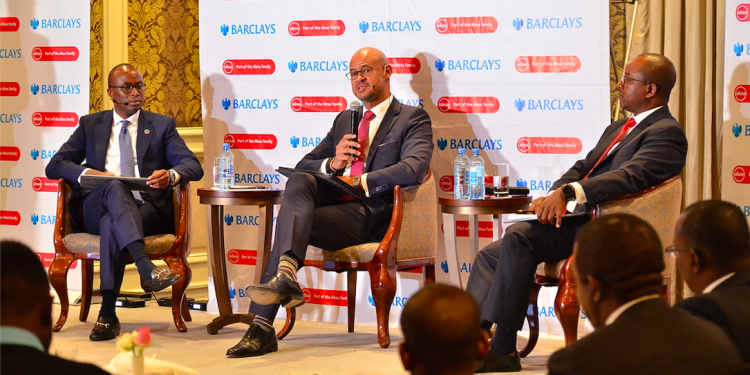Analysts are holding an optimistic outlook on Barclay Bank of Kenya’s stock (NSE: BBK) following the bank’s strong performance in 2018 and a successful first-year execution of its new strategy.
In a research note to investors on Kenya’s banking industry outlook, AIB Capital recently issued a buy recommendation, targeting price to rally to Sh 12.50 or an 11% upside from March 1 market price, when Kenyan banks released FY2018 results. SBG Securities, Kingdom Securities and Dyer & Blair Investments have also picked the stock in their list of recommended investments to buy.
In March, Barclays announced a 7% growth in Profit After Tax to Sh 7.4 Billion for the year ended 31 December 2018. During the period under review, the bank posted strong balance sheet growth with Total Assets expanding by 20% year on year to Sh 324.8bn, supported by 5% growth in Net Customer Loans and 12% year on year growth in Customer Deposits to Sh 207.4 Billion- its fastest growth rate in a decade. Earnings per Share (EPS) increased by 7% to Sh 1.37 which was in line with analysts’ consensus expectations. According to Genghis Capital, EPS is estimated to have grown circa 17% y/y if adjusted for one-off separation costs. Dividend per share of Sh 1.10 was declared, a 10% increase from FY2017, which translated to a dividend yield of 9.3% against market price and a dividend pay-out ratio of 81%. And with a 14% upside on stock price, this made Barclays the highest returning bank stock and large-cap stock at the NSE in 2018.
The analysts expect that the transition to the Absa brand will enable Barclays to transform its business and provide services tailored to the Kenyan market. It is also expected that the bank’s new strategy will drive robust growth going forward and unlock value for its shareholders.
Strong FY2018 performance a validation for the new strategy
Highlights from Barclays’ FY2018 performance seemed to reaffirm this bullish view on the bank’s strategy; including robust growth in Non Funded Income (NFI), improved operational efficiency and improved asset quality. NFI grew by 15% y/y to Sh 9.7bn, supported by a 65.5% y/y growth in fees and commissions on loans, coupled with other income which was mainly from fixed income trading.
In 2018, the bank launched Timiza Virtual Banking proposition which is expected to drive loans growth and fees and commissions income. The product was well received and has since acquired 3 million customers and disbursed loans worth Sh 10bn since launch in March 2018.
Operating expenses including loan loss provisions were well managed at 2.4% y/y increase, a 3.3% below 5.7% inflation. All line items registered decline apart from other operating expenses which grew due to separation costs incurred. As a result, Cost to Income ratio declined 130 bps to 54.2%, with the management notes pointing to 51% after adjusting for separation costs. It is expected that the bank will increase spending on rebranding; however, partly offset by shifting focus on digital channels and cost-saving initiatives. The management stated their holding company – Absa Group Limited – will provide capital to help mitigate capital and cash flow impact of the separation spend over time. As such, the management reiterated that the one-off separation costs are unlikely to impact dividend on the downside.
Non-performing loan ratio deteriorated by 35bps y/y to 7.8%, however there was a slight improvement of 30bps q/q. Impairment y/y growth was attributed to IFRS 9 adoption and some corporate names. The bank seems to have taken a more prudent and conservative view on IFRS 9 than most of its peers, indicating that y/y impairment growth in 2019 will likely to be better than peers. The bank is also leveraging on big-ticket recoveries and driving aggressive collections strategy to improve the NPL book.
Highest FY2018 total returns for shareholders drive market optimism
While NSE ASI fell by 18% during the 12-month trading period in 2018, BBK returned a 14% annual capital gain for its shareholders. As a result, the stock became the best performing bank stock and large-cap stock at the NSE in 2018. And with 10% increase in dividend pay-out recommended by the directors, BBK recorded the highest total returns for its shareholders compared to peer stocks.
Going forward, BBK stock is projected to be attractive to income investors with one of the highest dividend yield among NSE-listed bank stocks. Robust growth is expected as the bank’s new strategy increases focus on growing top line, transforming the business and delivering higher returns. The lender aims to scale up new income generating ventures such as bancassurance, stock broking, and digital banking. Market consensus estimates a target price for BBK stock at Sh 12.50. The stock traded at Sh 12.00 as at 30th April, a 10% gain in market value since the start of 2019.



